
On November 18, 2023, the "5th BNU Science of Law Doctoral Forum," organized by the Law School of Beijing Normal University, was successfully convened at Garden Hotel in Haidian District, Beijing. The forum carried the theme "National Governance and Innovative Development of Legal Theory in the New Era," comprising seven sessions and two roundtable discussions. It drew together a distinguished assembly of experts, scholars, and doctoral candidates from the National Judges College, Peking University, Tsinghua University, Renmin University of China, Fudan University, Shanghai Jiao Tong University, East China University of Political Science and Law, Jilin University, Zhejiang University, China University of Political Science and Law, Nankai University, Sun Yat-sen University, Xiamen University, Southeast University, Beijing University of Technology, Ocean University of China, Shanghai University of Finance and Economics, Nanjing Normal University, Hainan University, Shanxi University, Heilongjiang University, Wuhan University of Engineering, and Beijing Normal University, among others. Doctoral students presented thought-provoking commentaries on a range of topics, including "the construction of China's independent legal knowledge system," "explorations in the rule of law for building a community with a shared future for mankind," "research on the legal guarantee of major national development strategies," "legal protection of green mountains and clear waters," and "legal supply in the realm of new technologies." Eminent scholars and experts from the domestic academic community offered incisive feedback and insights within their respective fields of research. The one-day conference was replete with enriching content and fostered a vibrant academic environment.
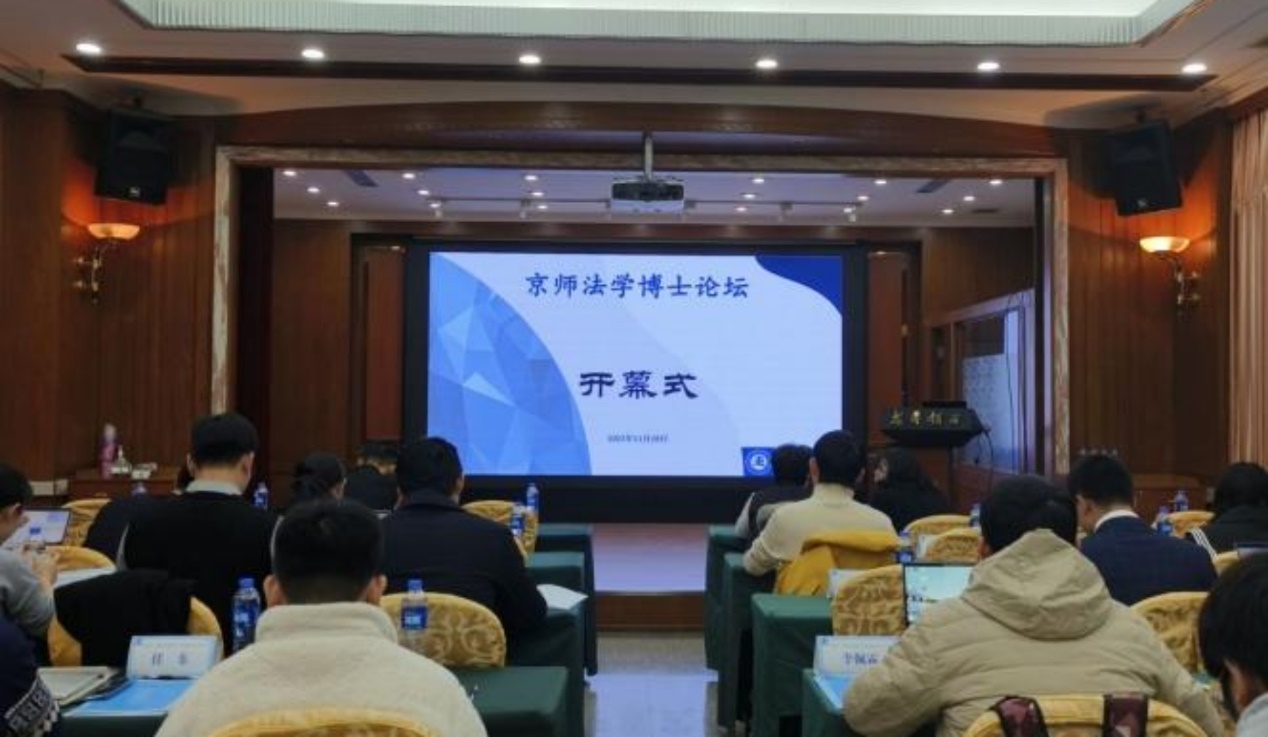
Opening Ceremony on November 18th
On the morning of November 18th, the forum commenced with an opening ceremony, presided over by Associate Professor Yan Houfu, the Director of the LL.M. Affairs Office at the Law School of Beijing Normal University. Professor Yan extended a warm welcome to the assembled experts, scholars, and doctoral candidates. In his address, he first took a moment to reflect on the storied history of the BNU Science of Law Doctoral Forum before casting a hopeful gaze toward its future. Marking a significant return to in-person gatherings after a two-year hiatus, and a nostalgic return to the venue of the inaugural forum, he implored the attendees to remain true to their scholarly pursuits and to value this rare opportunity for face-to-face dialogue. Professor Yan highlighted a key innovation of this year's forum: a deliberate reduction in the number of expert reviewers, coupled with the introduction of a dedicated segment for doctoral student discussions and the addition of two roundtable sessions. This strategic adjustment, he explained, was aimed at narrowing the "generation gap" in academic discourse, fostering a more equitable exchange where young doctoral scholars could engage, resonate, and draw inspiration from one another. He expressed his anticipation for a wealth of intellectual insights to emerge from the vibrant and spirited interactions that the forum was designed to encourage.
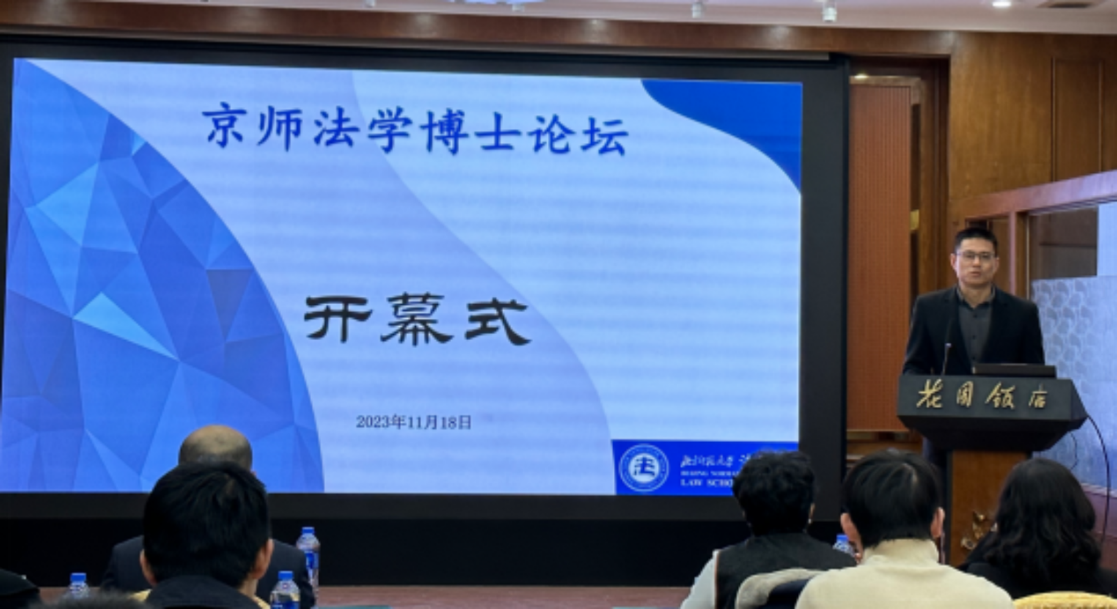
Wang Xiuli, Deputy Director of the Comprehensive Office of the Academic Affairs Department at Beijing Normal University, and Professor Liang Yingxiu, Dean, Professor, and Doctoral Supervisor of the Law School at Beijing Normal University, took the stage to deliver their addresses in sequence.
Deputy Director Wang Xiuli began by expressing her heartfelt appreciation for the invitation extended by the Law School and extended a warm welcome to the doctoral students from esteemed universities nationwide who had gathered for the doctoral forum at Beijing Normal University. She underscored the purpose of the BNU Science of Law Doctoral Forum: to align with the demands of the era, grounded in societal needs, to conduct forward-looking, targeted, and strategic legal policy research, and to harness the power of the rule of law in constructing a pathway to modernization unique to China. Deputy Director Wang emphasized the forum's embodiment of the commitment and sense of duty of academic luminaries to the advancement of China's modernization journey, as well as Beijing Normal University's expansive vision in contributing to the global community. She lauded the recent accomplishments of the Law School at Beijing Normal University and expressed her anticipation for the continued enhancement of the BNU Science of Law Doctoral Forum and the advancement in the quality of doctoral education at the Law School.
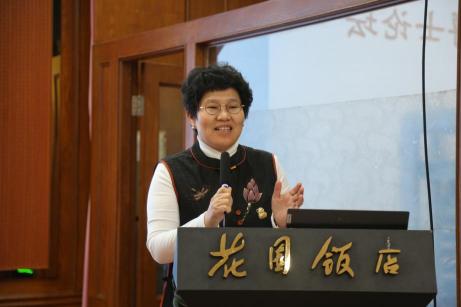
Professor Liang Yingxiu extended a warm welcome and heartfelt gratitude to all the distinguished guests in attendance, and celebrated the successful launch of the 5th BNU Science of Law Doctoral Forum. He highlighted that the BNU Science of Law Doctoral Forum serves as a vital conduit for fostering interaction among doctoral students from various institutions and for enhancing the caliber of doctoral education. To facilitate this exchange, the forum has diligently arranged a dedicated section for doctoral students to engage in discussions. Professor Liang expressed his hope that the doctoral students, embodying the spirit of "fearless calves challenging tigers," will seize the opportunity to engage in robust exchanges and mutual learning, and will courageously propose innovative ideas. He further encouraged all doctoral students to dedication their efforts towards advancing the construction of a community with a shared future for mankind, developing a legal theoretical framework with Chinese characteristics, and strengthening the global voice of Chinese legal theory.
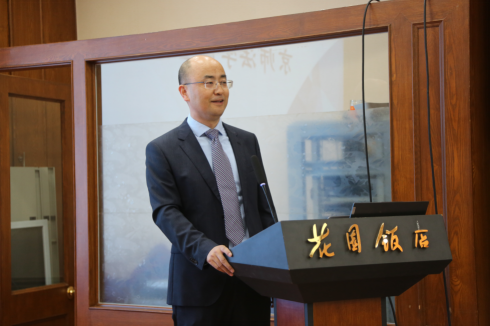
Following the leaders' addresses, Associate Professor Yan Houfu voiced his hope that the doctoral forum would foster a vibrant atmosphere, stimulate vigorous discussions, and yield impactful outcomes. Thereafter, all the guests joined the attending doctoral students for a group photo.
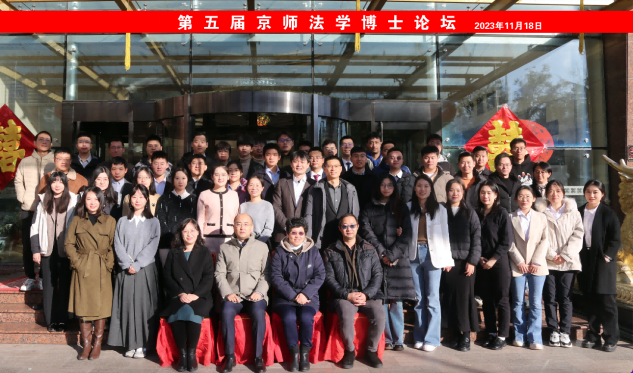
Theme report on the construction of China's independent legal knowledge system on the morning of November 18th
The theme report is divided into two units, namely "Construction of China's Independent Legal Knowledge System" and "Inheritance and Development of Excellent Traditional Chinese Culture", hosted by Liu Yingxi, a doctoral student from the Law School of Beijing Normal University.
The first unit "Innovation of Legal Theory in the New Era" has officially begun, which is hosted by Li Shuo, a doctoral student from the Law School of Beijing Normal University. Zhang Junhao from the Law School of Jilin University presented a paper titled “On the Demonstration of the ‘Rule of Law Field’ Concept in China’s Path to Modernization,” while Zhang Zhequan, a doctoral candidate at Fudan University’s Law School, contributed a report entitled “Judicial Decision-Making Grounded in Value Beliefs.” Pan Xiangjun, a doctoral student at Tsinghua University’s Law School, submitted a paper on “The Judicial Application of Customary Law in Family Asset Dispute Cases - An Empirical Study Based on 625 Judicial Documents.” Additionally, Chen Yudong from the Law School of Nanjing Normal University and Su Haiping from the Law School of Hainan University, along with Tan, presented their work. Associate Professor Ma Jianyin from the Law School of Beijing Normal University provided insightful expert commentary.
Commencing with the modernization of the Chinese-style rule of law, Zhang Junhao delved into the application and contemplation of the "domain" concept across various academic disciplines, including physics and mathematics. He elucidated the notion and architecture of the "rule of law domain," targeting its modernization as a dual pursuit of rule of law advancement and societal modernization. Zhang articulated the unique characteristics of this concept and ultimately affirms the "rule of law domain" theory. From a psychological vantage point, Zhang Zhequan examined the refinement of the value-based decision-making paradigm in judicial rulings. He approached this from three dimensions: delineating the value decision-making paradigm, addressing the paradigm's response to the inherent dilemmas of value judgment, and engaging in theoretical introspection on the paradigm itself. Pan Xiangjun's empirical study, grounded in an analysis of 625 judicial documents, reveals pronounced variations in the application of family asset division practices across different provinces. He noted the proactive role of judges in applying customary law and the supplementary recognition of party citations. Pan dissected the institutional and subjective reasons behind these findings and offers recommendations for enhancing judicial application, focusing on prerequisites, techniques, and guarantees. In the ensuing dialogue, Chen Yudong lauded the innovative nature of the aforementioned students' research, highlighting their multidisciplinary theoretical approach and extensive data examination. He stressed the importance of the rule of law research in China having practical relevance and urged a perspective that is grounded in the country's specific context.
Su Haiping's contribution to the conversation acknowledged the ambitious scope of Zhang Junhao's work, while also noting the constraints of space that precluded an exhaustive treatment of the subject. He posed critical questions, such as the equivalence of “domain” to “field,” and offered advice on the article's structure and evidentiary support. Additionally, Su provided insights on the model's applicability and the concept of value beliefs in Zhang Zhequan's paper, as well as suggestions for the data scope and analytical focus in Pan Xiangjun's research.
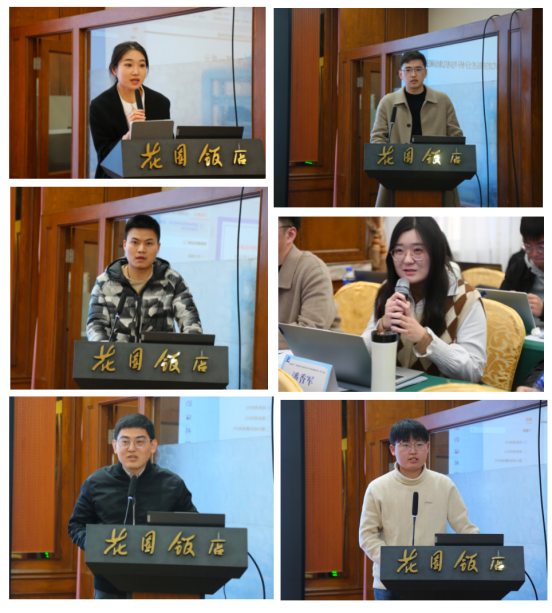
In the expert review segment, Associate Professor Ma Jianyin commenced by surveying the evolution of various youth forums. He expressed concerns over the perceived decline in the study of basic jurisprudence in recent years and provided a historical analysis of the research perspectives within Chinese jurisprudence since the late Qing Dynasty's legal reforms. His aim was to delve into the interplay between politics and legal scholarship, cautioning against the reduction of law to a tool of political interpretation. In acknowledging Chinese jurisprudence as inherently a study of comparative law, Ma emphasized the need to address the intersection between Chinese and Western legal traditions, suggesting a strategic approach to "integrate" Western legal concepts into China's societal framework. He critiqued Zhang Junhao's paper for its brevity, which he felt insufficiently articulated the author's perspectives, and offered guidance on sharpening the focus of the writing. Ma also highlighted what he perceived as a pronounced psychological bias in Zhang Zhequan's work, noting its oversight of the impact of cultural context. Regarding Pan Xiangjun's contribution, he characterized it as a standard legal sociology piece and proposed recommendations for a deeper analysis of the article's context and the derivation of its conclusions.
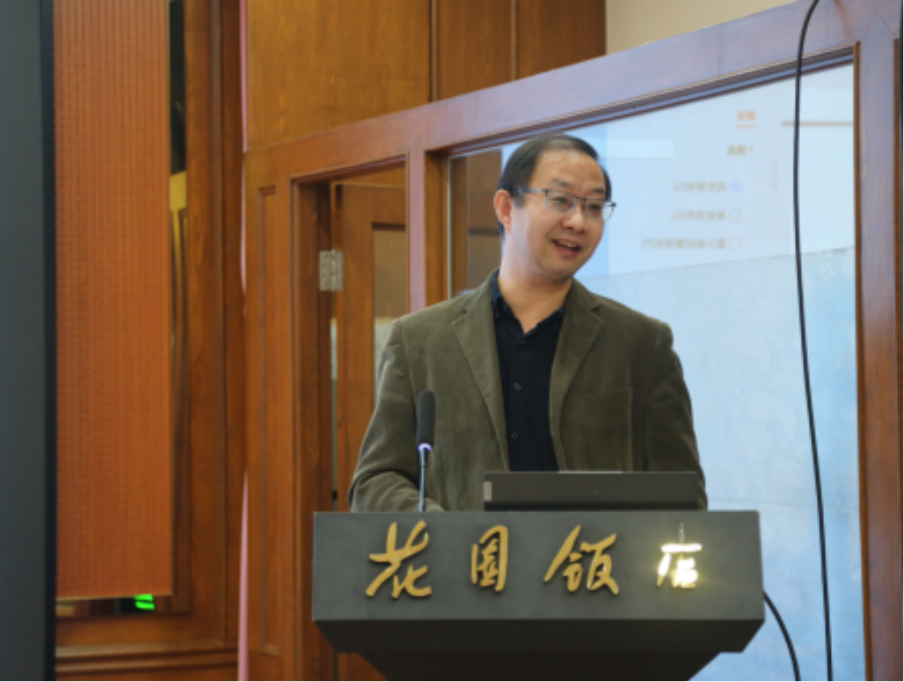
In the response and discussion session, the attending students had in-depth academic exchanges with the doctoral students who gave presentations.
The theme of the second unit is "The Inheritance and Development of Excellent Traditional Chinese Legal Culture", hosted by Zhou Kai, a doctoral student from the Law School of Beijing Normal University. This unit features a report titled "The Connotation of Excellent Traditional Chinese Culture in the Civil Code" by Shao Yongqiang, a doctoral student from the Law School of China University of Political Science and Law, and a report titled "The Changes in the Pattern of Human Rights Development from the Perspective of Traditional Chinese Legal Culture" by Guan Na, a doctoral student from the Law School of Hainan University. Wang Yiran, a doctoral student from the School of Humanities at China University of Political Science and Law, and Chen Ze, a doctoral student from the Law School at Beijing Normal University, and Tan. Professor Wang Li from the National Academy of Judges provides expert comments.
Shao Yongqiang's report is centered on three key issues: the intrinsic value of China's excellent traditional culture, the logical structure—both internal and external—of this culture within the Civil Code, and the tangible transformation of excellent traditional Chinese cultural elements within the Civil Code. The report concludes with the observation that the explicit and implicit threads within the Civil Code are mutually reinforcing. Guan Na's report begins with an overview of the theory and application of human rights in China. It then delves into a comprehensive analysis from three distinct angles: the evolutionary trajectory of Chinese human rights thought through its three developmental stages, the paradigm shift that characterizes these stages of human rights evolution, and the underlying logic of human rights progress as viewed through the lens of Chinese traditional culture. This multifaceted approach is employed to explore the paradigm innovation and value significance of the new epoch of human rights advancement in the contemporary era.

During the discussion, Wang Yiran commenced by commending the speaker's cultural confidence. She praised Shao Yongqiang's report for its concise and precise language, and the content's value orientation of "morality as the cornerstone and punishment as the supplement," which effectively aligns values and norms. She noted, however, that Guan Na's report was constrained by length, resulting in an incomplete exploration of the evolution of human rights from the perspective of traditional legal culture. Nevertheless, she highlighted Guan Na's proposal of "people-oriented human rights" in China as a remarkable theoretical innovation. Chen Ze remarked on the distinct strengths and focal points of both papers. He praised Shao Yongqiang's report for its clear structure and logical progression, and suggested further research, such as applying the findings to micro-level rules within the broader implementation of the Civil Code. He also acknowledged the innovative significance of Guan Na's report and offered recommendations for refining the article's details.
In the expert review segment, Wang Li expressed her appreciation for the youth's focus on traditional legal culture. She argued that the inheritance and development of excellent traditional legal culture must adhere to political guidance, particularly the philosophical insights of Xi Jinping's cultural thought. The harmonious vision of man and nature, the societal perspective of harmony in diversity, and the moral perspective of a benevolent human heart in Xi Jinping's cultural thought, she contended, are crucial underpinnings for scholarly research. Wang Li also stressed the importance of cultural confidence in research endeavors. For instance, in the study of human rights, although the concept did not exist in ancient China, the relevance of many related historical contents should not be overlooked. Moreover, she discussed how to infuse socialist core values into the study of traditional legal culture, emphasizing the significance of details within historical texts and offering theoretical and practical enhancements to Guan Na's report.
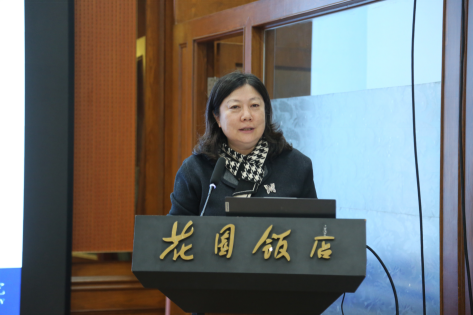
First Sub-forum of “Exploring the Rule of Law in Building a Community with a Shared Future for Mankind” on the Afternoon of November 18th
The theme of the first sub-forum was "Exploring the Rule of Law in Building a Community with a Shared Future for Mankind", and each unit was hosted by Liu Ziliang, Li Jing, and Zhou Xinmiao, doctoral students from Beijing Normal University.
Unit 1 of the First Sub-forum: Criminal Policy and Social Governance for Minor Crimes
The first unit of the first sub-forum, themed "Criminal Policy and Social Governance for Minor Crimes," was moderated by Liu Ziliang, a doctoral candidate from Beijing Normal University. This session featured presentations by Ren Dong, a doctoral candidate at China University of Political Science and Law, with a paper titled "Reflections on the Governance Model of Minor Crimes of 'Policy Offending' - A Case Study of Drunk Driving," and Sheng Jiajun, a doctoral candidate at Tsinghua University Law School, with a paper titled "How Public Fear of Crime is Exaggerated: A Consideration of How Criminal Law Should Address Public Anxiety." Zuo Zhiming, a doctoral candidate at Nankai University Law School, contributed a paper titled "Reflection and Reconstruction of the Criminal Law Article 13, Clause 13, Punishment Mechanism." The session also included contributions from Zhang Yin and Fan Shaojiang, both doctoral candidates at Beijing Normal University Law School. Associate Professor Zhao Shuhong from the Law School of Beijing Normal University provided expert commentary.
Ren Dong suggested that the "Eighth Amendment to the Criminal Law" should classify drunk driving as a form of dangerous driving, addressing the underlying issue of "challenges in governing minor offenses." He delved into the historical context of drunk driving regulation in China and offered profound insights from both practical governance perspectives and entrenched litigation norms. Sheng Jiajun highlighted that public fear of crime does not always align with crime trends. The media's exaggeration and the rapid dissemination of information in the internet age are significant factors contributing to the escalation of crime-related fears. In response, he advocated for increased national efforts in risk communication, broader public participation in criminal justice, and enhancements to collective efficacy, urging the criminal law to adopt a modest stance.
Zuo Zhiming contended that the legal foundation for the presumption of guilt is rooted in its dual legislative and judicial orientation, as well as its alignment with the principle of legality in crime and punishment. He examined the systemic role of the presumption of guilt through a dual lens: the normative interpretation of the presumption of guilt provisions and its position within the criminal constitutional framework. Zuo conducted a critical review and reflection on the current presumption of guilt framework, suggesting a direction for the construction of a more appropriate presumption of guilt mechanism.
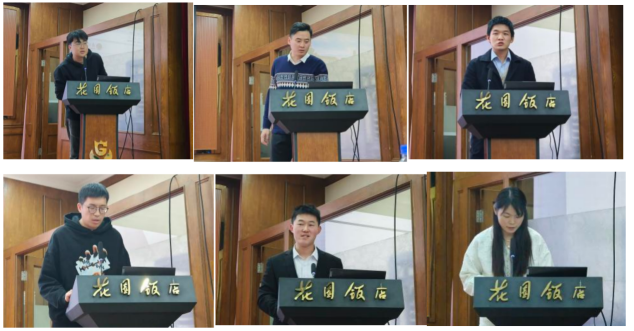
Zhang Yin, a panelist, commends all three presenters for their insightful and outstanding reports. Regarding Dr. Ren Dong's paper, he finds the topic selection to be innovative and recommends that specific solutions be proposed for the interaction between programs and entities. As for Dr. Sheng Jiajun's contribution, Zhang Yin finds the exploration of public fear of crime to be thought-provoking, but suggests that there is room for improvement in the use of subheadings and the proactive legislative perspective in the age of minor crimes, which could benefit from stronger empirical support. Addressing Dr. Zuo Zhiming's paper, he considers the exploration of the criminal pathway for a book to be significant and advises enhancing the discussion on the commission of the crime, distinguishing between significant and minor circumstances, and the concept of trivial harm within the elements of the crime. Fan Shaojiang, a panelist, also shared his perspectives on the doctors' articles: for Dr. Ren Dong's paper, he suggests a more in-depth analysis of the pros and cons of criminal policies and a stronger case for the construction of policies and procedures related to minor offenses. In regards to Dr. Sheng Jiajun's paper, he proposes enriching the content of the criminal law response and considering the role of the media in proposed solutions. For Dr. Zuo Zhiming's paper, he raises a point for debate, questioning whether the clause in question lacks the function of illegal obstruction.
Teacher Zhao Shuhong believes that the three students have solid basic knowledge and meaningful topic selection in their articles, but there is a common problem, which is the lack of logical reasoning ability in their arguments. This is related to China's long-standing cultural traditions and ways of thinking. Regarding Dr. Ren Dong's article, he believes that the previous section on the governance of drunk driving is very detailed and worthy of recognition, but the subsequent countermeasures are insufficient and need further elaboration; Regarding Dr. Sheng Jiajun's article, he suggested enriching the content of the literature review and using more empirical data to illustrate the problem; Regarding Dr. Zuo Zhiming's article, he proposed that China's rule of law construction should not blindly draw on the content of foreign laws, but should deeply consider the sources of theory and improve it in combination with China's local legal environment. Finally, the three articles are affirmed, and it is also recommended that the three PhDs and other students pay attention to strengthening their argumentative abilities and language proficiency.
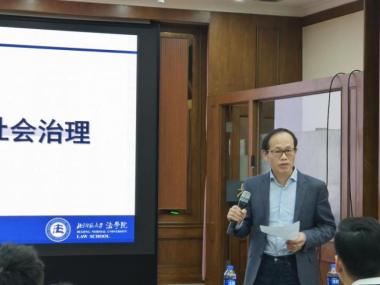
Unit 2 of the First Sub-forum: Theoretical Development of Public Interest Litigation
The second unit of the first sub-forum, themed "Theoretical Development of Public Interest Litigation," was moderated by Li Jing, a doctoral student at Beijing Normal University. Within this session, Zhao Xin, a doctoral candidate from the Law School of Beijing University of Technology, presented a paper titled "An Empirical Study on the Subject Qualification and Nexus in Ecological Environmental Damage Compensation Litigation from the Perspective of the Civil Code." Concurrently, Xu Qiaoling, a doctoral candidate from the Law School of Renmin University of China, delivered a report entitled "Exploring the Fengqiao Experience and the Corresponding Model of Prosecutorial Public Interest Litigation in the New Era." The session also featured insights from Lecturer Li Shuxun of the Law School and Business at Wuhan University of Technology and doctoral student He Jialuo from the Law School at Ocean University of China. Professor Xiong Yuemin, a doctoral supervisor at the Law School of Beijing Normal University, offered nuanced expert commentary.
In her presentation, Zhao Xin delved into the practical challenges of ascertaining and establishing the qualifications of litigation subjects. She analyzed the normative constructs of legal texts and proposed that judicial interpretations should be employed to explicitly delineate the qualifications of litigation subjects for governments at or below the city and prefecture levels (including county-level districts under the jurisdiction of municipalities directly governed by the central government), their designated departments or institutions, and rural collective economic organizations. Looking forward, she advocated for the establishment of a unified and progressive litigation subject structure in China that encompasses "administrative bodies, environmental protection organizations, social groups, procuratorial organs, and rural collective economic organizations."
Xu Qiaoling's research highlighted the practical obstacles faced by the responsive prosecutorial public interest litigation model, including the "nationalization" of the public interest litigation's implementing body and the limited scope of public interest objects. She contended that the model should be grounded in local theories, meticulously balancing the proactive and restraining nature of prosecutorial power. She urged for an expansion of the case scope, the lawful fulfillment of duties by prosecutorial organs, the innovation of performance methods, the activation of social organizations' vitality, and the construction of a grassroots, bottom-up dispute resolution framework.
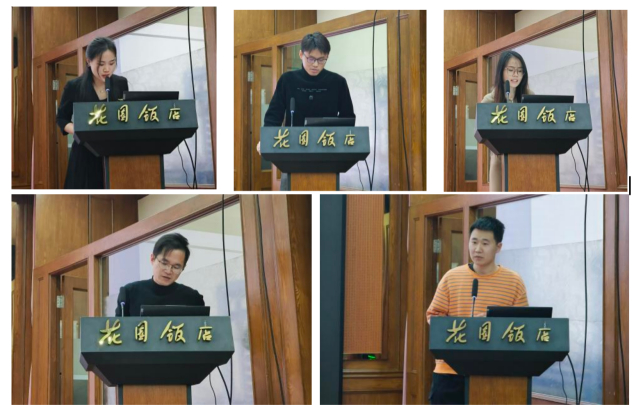
Panelist Li Shuxun lauded the two presented articles for their clear logic, distinct perspectives, and innovative themes, offering several constructive recommendations. For Dr. Zhao Xin's work, he suggested a clearer theoretical delineation between ecological environmental damage compensation litigation and environmental public interest litigation, underscoring the importance of strengthening the argumentation and persuasiveness of the case analyses. Regarding Dr. Xu Qiaoling's research, Li Shuxun appreciated the topical significance and the author's novel approach, advising a more profound integration of the "Fengqiao Experience" with public interest litigation and a further refinement of the argumentation and reasoning. Fellow panelist He Jialuo commended Dr. Zhao Xin's article for its effective macro-to-micro focus, enriched by instructive case studies. He also echoed the need to differentiate between environmental public interest litigation and ecological environment damage compensation litigation, noting the ongoing debate surrounding the expansion of litigation subjects. As for Dr. Xu Qiaoling's article, He Jialuo praised its clear conceptualization and the uniqueness of the chosen topic, while also emphasizing the necessity for a stronger theoretical and logical underpinning. He advised the author to delve further into relevant scholarly works to enhance the article's depth.
Professor Xiong Yuemin, aligning with the legislative planning of the Standing Committee of the National People's Congress, timely proposed the theme of this unit, emphasizing its significant theoretical relevance. She commended Dr. Zhao Xin's article for its astute capture of the new legal provisions in the Civil Code, its thematic research methods, and the robustness of its empirical research. She suggested further clarifying the distinction between environmental damage compensation litigation and environmental public interest litigation. Regarding Dr. Xu Qiaoling's article, Professor Xiong appreciated its diverse perspectives, comprehensive content, and profound theoretical foundation, recommending a stronger alignment between the "Fengqiao Experience" in the new era and the responsive public interest litigation model of the procuratorate. In conclusion, she engaged in a discussion of several key theoretical issues in public interest litigation with the attending students, hoping to draw the attention of students in related research fields to these critical theoretical matters.

Unit 3 of the First Sub-forum: Foreign-related Rule of Law and National Governance
The third unit of the first sub-forum, themed "Foreign-related Rule of Law and National Governance," was moderated by Zhou Xinmiao, a doctoral candidate from Beijing Normal University. This session showcased a thought-provoking report by Ma Shangqi, a doctoral student at Southeast University Law School, entitled "Insufficient Regulation of Cross-border Financial Data Flow under the FTAs Framework and Chinese Implications," alongside a compelling presentation by Huo Junxian, a doctoral student at Xiamen University Law School, titled "Differences in Regulation and China's Response to DEPA Cross-border Data Flow." The discussions were enriched by the expert commentary of Mao Zhengkai, a doctoral student at the Law School of Ocean University of China, Li Jia, a doctoral student at the Law School of Jilin University, and Professor Li Bin, a doctoral supervisor at the Law School of Beijing Normal University.
Ma Shangqi highlighted several deficiencies in the regulation of cross-border financial data flow within the FTAs framework: a lack of a unified definition and clear classification of financial data, incomplete "cross-border" regulatory provisions, and the challenges in coordinating and applying the exception provisions of the three primary regulatory models of the United States, the United Kingdom, and China. These issues stem from varying national positions on financial data openness, the lag in international legislation on financial data, and the soft law nature of existing international financial data legislation. To improve cross-border financial data rules under the FTAs framework, Ma Shangqi advocated for guidance by the "overall national security" concept, a comprehensive advancement of the international and domestic rule of law for financial data, proactive engagement in cross-border international rule cooperation negotiations, and enhancements to domestic legislative supporting measures. Huo Junxian delved into an analysis of the DEPA rules and their distinct characteristics, comparing the similarities and differences between DEPA and China's RCEP in terms of cross-border data flow regulations. He posited that the strategic value of joining DEPA lies in mitigating potential geopolitical risks, expediting the development of a "Chinese-style template" for digital governance, addressing governance deficits, and providing quality public goods. In conclusion, Huo Junxian offered China-specific recommendations, including adhering to a legislative concept of cooperative inclusiveness, constructing diverse cross-border jurisdiction requirements for data, investigating cross-border data flow mechanisms with limited exceptions in free trade zones (ports), and harnessing the intrinsic momentum of international cooperation to forge higher-level rules.
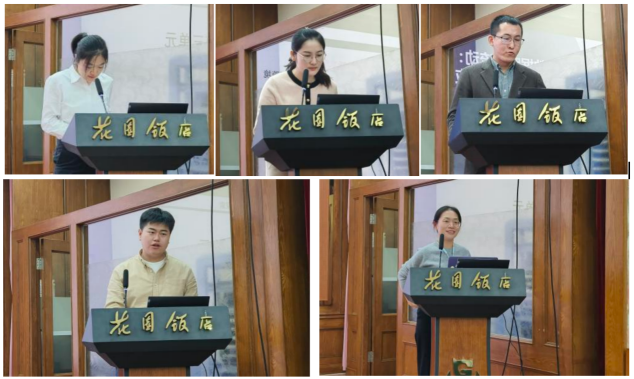
According to Panelist Mao Zhengkai, both scholarly articles are bolstered by robust arguments and coherent narratives. Regarding Dr. Ma Shangqi's work, it is recommended that a more detailed explanation of the FTAs framework be provided, and that the "Chinese-style inspiration" be reframed to concentrate on the strategies China might employ to rectify the deficiencies in the cross-border financial data flow system. In response to Dr. Huo Junxian's piece, the suggestion is made that in the advancement of China's regulatory framework for cross-border data flow, a balance must be struck between the growth imperatives of digital trade, the existing state of cross-border data flow regulations, and the stipulations of international accords in which China is a participant. The common advice is to conduct a thorough analysis of the ideological frameworks, societal contexts, behavioral inclinations, and external conditions that shape the governance choices of different nations and economies regarding cross-border data flow.
Li Jia, another panelist, considered both articles to be at the forefront of data law research. The authors' exploration of cross-border data flow within the context of international economic law is deemed particularly prescient. Li Jia notes that China must navigate the complex landscape of cross-border data flow provisions in international economic pacts, seeking an optimal equilibrium between the free flow of data and the assertion of data sovereignty. Addressing the diverse data regulation clauses in various international economic agreements, based on national interests and specific circumstances, is an immediate and pressing concern for all countries.
Professor Li Bin esteemed the two articles for their innovative subjects, substantial content, and theoretical significance, and offers targeted feedback: For Dr. Ma Shangqi's article, he suggested a deeper dive into the policies or rationales underpinning the issue, the diverse strategies adopted by countries to balance security with the free movement of data, and the formulation of practical countermeasures and recommendations. Regarding Dr. Huo Junxian's article, Professor Li Bin acknowledged the timeliness of the topic and highlights the article's insightful examination of exceptional practices in free trade zones, such as the establishment of negative lists. He advised further elaboration on how these systems can effectively fulfill their intended functions and encourages a more strategic approach to the research.
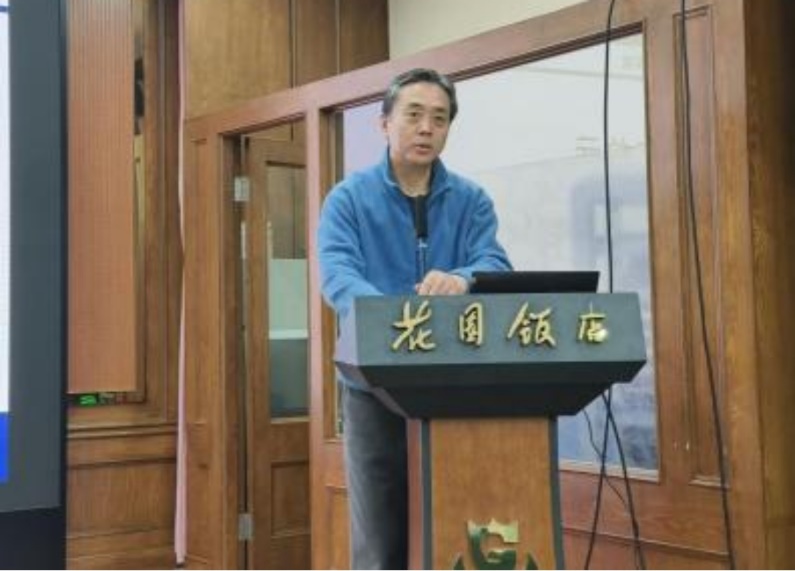
Second Sub-forum of “Research on the Rule of Law Guarantee for Major National Development Strategies” on the afternoon of November 18th,
The theme of the second sub-forum was "Research on the Rule of Law Guarantee for Major National Development Strategies". Each unit was hosted by Li Shuo, a doctoral student from the Law School of Beijing Normal University.
The theme of the second sub-forum was "The Independent Knowledge System of Economic Law in the New Era and Economic Security." This session featured a presentation by Chang Huan, a doctoral candidate from the Law School at Beijing Normal University, titled "On the Independent Knowledge System of Chinese Economic Law – An Analysis of the Discipline's Universality, Specialization, and Inclusiveness." Zhu Weirui, a doctoral candidate at the Law School of Shanghai Jiao Tong University, presented a paper entitled "Theoretical Review and Normative Construction of the Abuse of Relative Advantage from a Functionalist Perspective." The discussion session included contributions from doctoral students Liang Jingting and Huang Zijin of the Law School at Beijing Normal University, with expert commentary provided by Professor Li Rui, a faculty member and doctoral supervisor at the School of Civil, Commercial and Economic Law of China University of Political Science and Law.
Chang Huan argued that the study of China's economic reform should not be confined to a comparative approach alone but should strive for a balance between universality and particularity, emphasizing China's subjective elements and autonomy. He suggested that we should harmonize the unique characteristics with the universal aspects of China's inclusive economic law, reinforcing its universality while respecting factual differences, and investigate the potential for advancing inclusive global development. Zhu Weirui addressed the anticompetitive risks associated with the abuse of comparative advantage in China's internet sector and the regulatory status quo of such practices under the existing legal framework. Despite the appearance of regulatory coverage, he noted that these laws are not effectively enforceable. Zhu Weirui advocated for the integration of the theory of abuse of comparative advantage into the Anti-Unfair Competition Law system, elucidating how this theory can enhance the functions of the Anti-Unfair Competition Law and provided a detailed analysis of the specific elements for the application of the norms.
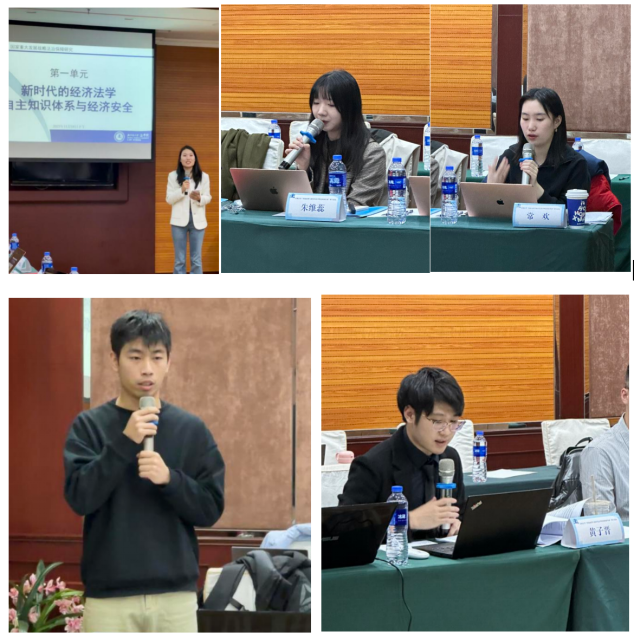
In the discussion session, Liang Jingting shared his own thoughts on how to determine the subject of world economic law, how to develop a more inclusive legal system in China, the necessity of incorporating the theory of abuse of relative advantage into the Anti Unfair Competition Law, and whether there is a real problem of abuse of advantages in the core examples. Huang Zijin summarized the overall framework of the two reports mentioned above and proposed whether it is possible to further discuss the systematic regulation of economic law through universality, specificity, and inclusiveness, as well as how to overcome the ambiguity of positioning abuse of dominant positions and effectively respond to the increased costs and problems in legislative protection.
In the expert review section, Professor Li Rui fully affirmed the cutting-edge nature of the issues focused on in the two articles, pointing out that generations of Chinese economic law scholars have always strived to build a localized independent knowledge system. Professor Li Rui believes that the two articles adopt a macro narrative perspective, triggering her new thinking - in the new stage of intelligent and digital development, what can economic law do? Economic law scholars need to actively respond to the challenges and new requirements brought by the digital economy, especially by having a deeper reflection on the basic theories of economic law, striving to propose their own analytical framework, and then providing further answers to issues such as the social orientation and substantive justice of economic law. They can also focus on analyzing data elements in the digital economy under the underlying logic drive of traditional market economy.
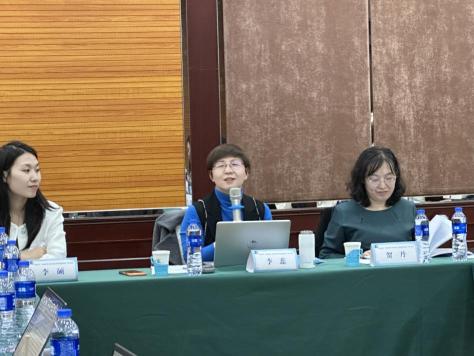
The second unit of the second sub-forum explored "Theoretical Development of Rule of Law Administration and National Governance." This session showcased a presentation by Yang Wen, a doctoral candidate from the Law School of East China University of Political Science and Law, entitled "Interpretation of the Connotation of the 'Prevention First' Principle in China's Public Health Law." Lai Minghua, a doctoral candidate at Sun Yat-sen University Law School, presented "On the Functionalist Relationship between Platform Responsibility and Government Regulation." Additionally, a doctoral student from the Law School of Zhejiang University delivered a report titled “Consensus or Confrontation? Defining the Boundary of Pre-litigation Mediation in Administrative Disputes.” The discussion session included inputs from Cheng Bin, a doctoral candidate from the Law School of Beijing Normal University, and Jiang Yitian, a doctoral candidate from the Law School of Southeast University, with insightful commentary provided by Associate Professor Tang Can from the Law School of Beijing Normal University.
Yang Wen highlighted the ambiguous nature and positioning of the "prevention first" principle in China's public health law, which hinders its normative and guiding role, necessitating an urgent interpretation of its connotation. She delineated the principle's fundamental connotations and elements from various perspectives, including value objectives, responsible entities, prevention targets, and internal logic, offering a nuanced explanation of the principle's internal structure. Lai Minghua noted that current research predominantly focuses on强化platform responsibility, with scant discussion on how government regulation can effectively interface with platform responsibilities to optimize outcomes. Amidst the evolving landscape, a functionalist approach to the rule of law has emerged among legislative bodies, regulatory agencies, and platform enterprises. However, in the realm of platform governance, there has been a unilateral trend toward intensifying platform responsibilities. As a pivotal regulatory entity bridging past and future in the functionalist paradigm, the government should assume a more pivotal role by advancing the meta-regulatory model and shifting the focus of oversight to the examination and supervision of platform internal management plans. Liu Zijing argued that pre-litigation mediation in administrative disputes, which has gained prominence in recent judicial practice, grapples with issues such as ambiguous system positioning, unclear application scope, and uncertain termination procedures. He advocated for adopting a "summary plus enumeration plus exclusion" model to delineate the scope of pre-litigation mediation and to refine the termination mechanism for administrative dispute mediation based on the legitimacy of establishing administrative mediation boundaries.
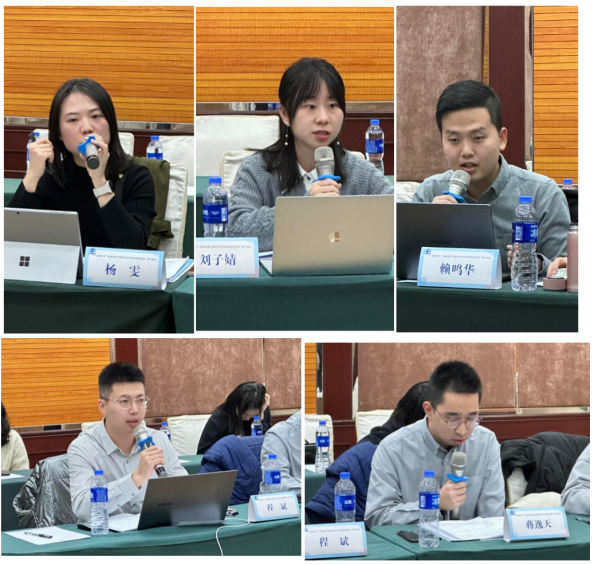
In the discussion session, Cheng Bin summarized the content of the three students' reports using "new" and "real": "new" is reflected in the novelty of the topic selection, perspective, and viewpoint; 'Reality' is reflected in the truthfulness of the problem, the richness of the content, and the solid foundation. Based on this, three students have put forward their own opinions on their papers. Jiang Yitian briefly summarized the main content of the three students' reports and put forward his own improvement suggestions on the improvement of the argumentation path, further discussion of the relationship between concepts, and enhancement of policy pertinence in some parts of the article.
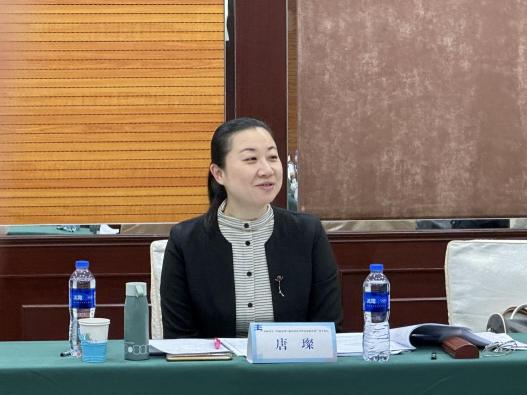
In the expert review segment, Associate Professor Tang Can offered tailored feedback on the papers presented by three doctoral students. Regarding Yang Wen's paper, Associate Professor Tang Can commenced by praising her exemplary methodology, which adeptly employs purposive and systematic interpretation to elucidate the "prevention first" principle within public health law. He suggested that Yang Wen further elaborate on the principle's connotations and interpretations in the context of post-outbreak developments, strengthen the argument for translating policy into legal principle, and address contemporary legal revision trends by examining the interplay between the "prevention first" principle and other legal principles. Associate Professor Tang Can commended Lai Minghua for selecting a timely and sensitive research topic but noted that the paper could benefit from stronger connections between its arguments and the broader field of e-commerce. He highlighted the need for a more robust justification of government intervention in enterprise internal management plans and urged a more comprehensive demonstration of the interaction between the two dimensions, expressing hope for further refinement. For Liu Zijing's paper, Associate Professor Tang Can acknowledged the importance of the topic and offered detailed feedback on aspects of the paper's formatting that required adjustment. He provided specific guidance on the content, such as selecting cases more pertinent to administrative litigation, ensuring that different viewpoints are harmonious rather than contradictory, and enhancing the clarity of logical reasoning in the paper's structured sections.
Roundtable Forum on the afternoon of November 18th
The first Roundtable Forum centered on the theme "Legal Protection of Green Waters and Mountains," skillfully moderated by Han Kangning, a doctoral candidate from the Law School of Beijing Normal University. During the session, Li Peilin, a doctoral candidate from the Law School of China University of Political Science and Law, delivered a keynote address titled "Interpreting the Ecological Environment Damage Compensation Liability System in the Civil Code." Feng Li, a doctoral candidate at the Environmental Law Research Institute of Wuhan University, spoke on "China's Green and Low-Carbon Legal System in Pursuit of the 'Dual Carbon' Goal: Practical Challenges and Pathways to Enhancement." Li Xiaohui, a doctoral candidate from the Law School of Peking University, presented a keynote speech on "The Application of the Precautionary Principle in the Judicial Protection of Biodiversity: Current Status and the Development of Normative Application Strategies." Contributions also came from Liang Shusen, a doctoral candidate at the Law School of Sun Yat-sen University, Liu Rui from the Law School of Beijing Normal University, and Zhang Xiaokang from the Law School of Shanxi University. Assistant Professor Wu Kaijie from Peking University provided insightful commentary and guidance.
Li Peilin's analysis commenced with the historical evolution of China's civil liability system, charting the development of the ecological environment damage compensation liability system. She identified the strengths and weaknesses of the current system, proposing theoretical solutions to address existing issues by utilizing a rights and claims system as an intermediary and clarifying responsibility relationships. She also elucidated the functions and nature of ecological environment damage compensation liability.
Feng Li outlined the status quo of China's green and low-carbon legislative framework, delineated the fundamental elements of the low-carbon legal system, and exposed the practical hurdles faced by China's green and low-carbon laws. Drawing on the green and low-carbon legal experiences of Germany and the United Kingdom, she synthesized relevant insights for China and ultimately proposed a roadmap for enhancing China's green and low-carbon legal system.
Li Xiaohui's presentation began with the Green Peacock case, underscoring the significance of the precautionary principle in biodiversity conservation. By examining key judicial rulings, she explored the application of the precautionary principle across various case types, including civil public interest litigation, administrative litigation, administrative public interest litigation, and criminal litigation. She concluded by noting that many current judicial documents grapple with conceptual ambiguity and a lack of theoretical foundation in the application of the precautionary principle, advocating for its legitimate application.
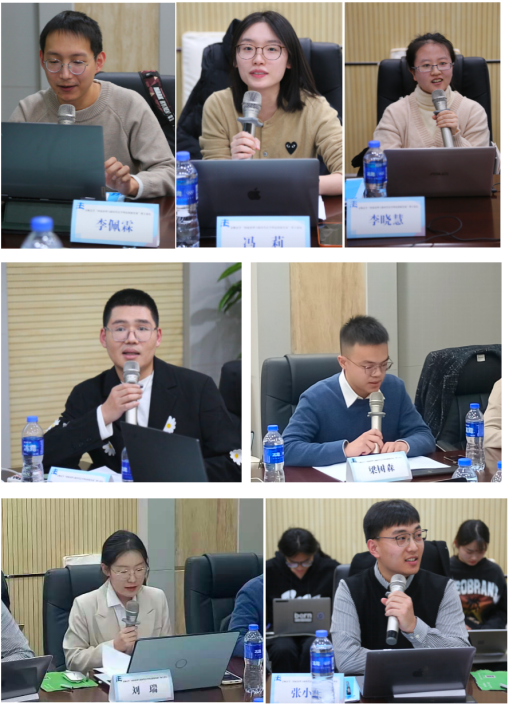
Liang Shusen commends Li Peilin's article for its comprehensive analysis of historical motivations and current institutional discrepancies, as well as its integration of normative, historical, and case analyses. He finds the work academically rigorous and timely. However, he questions whether the article's intent is to discuss legislation or legal application. Regarding Feng Li's piece, Liang Shusen acknowledges its thorough summary of China's green and low-carbon legal framework, the identification of systemic obstacles, and its practical significance. He suggests, however, that the article should delve deeper into whether green and low-carbon are value concepts or legal principles and if they suffice as the primary logical thread. For Li Xiaohui's article, he recognizes the identification of challenges in the application of the precautionary principle in biodiversity judicial protection but criticizes the lack of discussion on scientific uncertainty, application standards, risk decision-making, and other aspects. He also notes the need for a more hierarchical structure and discourse adjustment.
Liu Rui finds the argumentative strategies and writing styles of her peers' papers highly valuable. She suggests that Li Peilin's title "Commentary" may not encapsulate the article's content fully. For Feng Li's work, she recommends a simpler title and a more detailed exploration of problem causes. She also points out the need for a discussion on how foreign laws can be adapted to China's context. Regarding Li Xiaohui's article, Liu Rui advises streamlining the title and chapter headings and emphasizes the need to strengthen the application of judicial protection, as well as a comparative analysis of the precautionary principle in biodiversity conservation and environmental civil public interest litigation.
Zhang Xiaokang appreciates the maturity of Li Peilin's writing but questions the application of the property rights principle to argue for ecological and environmental damage compensation. For Feng Li's article, he highlights the need to focus on the reasons, functions, and legal regulations of Germany's legislative approach, considering China's different stage in carbon neutrality. He suggests that Li Xiaohui's article should clarify the application boundaries of the precautionary principle and examine the political and value implications of the cases discussed.
Assistant Professor Wu Kaijie offers constructive feedback on the papers, emphasizing the importance of topic selection, structure, argumentation, and form in a quality paper. He suggests that Li Peilin's article could benefit from a more balanced approach, with a stronger argument section and further explanation of the impact of differentiating responsibility types on legislation and justice. For Feng Li's article, he recommends focusing on a clear core viewpoint and a logical problem-solving structure, with an improved comparative law section. Wu Kaijie advises Li Xiaohui to narrow the topic scope, update the literature, and strengthen the argument with selected cases, distinguishing between primary and secondary points in the writing structure.
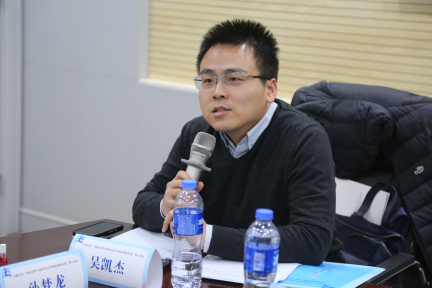
The second Roundtable Forum centered on the theme "Legal System Supply in the Realm of New Technologies," expertly moderated by Dr. Lu Li of Beijing Normal University. The event showcased thought-provoking keynote addresses, including "Copyright Controversies and Legal Applications of Metaverse Entities" by Tsinghua University Law School doctoral candidate Xiaochu Tian, "Defining Copyright for Deep Synthesis Products" by Peking University Law School doctoral candidate Bin Lin, and "Exploring Legal Risks in Cloud Computing User Data Migration" by Beijing Normal University Law School doctoral candidate Lingli Yang. The forum also featured insightful expert commentary from Qin Ruibiao of the Shanghai University of Finance and Economics Law School, Zhang Weichen of the Beijing Normal University Law School, Sun Menglong of the Heilongjiang University Law School, and Lecturer Yang Xu from the Beijing Normal University Law School.
Tian Xiaochu proffered an extension of copyright theory within the metaverse, delineating the concept and its progenies, as well as the legal rights disputes prevalent in this domain. She engaged the audience in focused dialogues on the tension between "public domain" and "private rights," the equilibrium between rights formalism and rights evaluativism, and the transition from "monism" to "pluralism" in rights limitation criteria. Tian proposed that the application of copyright law in the metaverse necessitates a reevaluation of originality standards, the demarcation of subject matter criteria, and the framework for rights restriction.
Lin Bin, drawing upon the notion of deep synthesis technology and pertinent judicial precedents, highlighted the challenges in legally characterizing deep synthesis products and examined potential reforms to the copyright system. He invoked the seminal "Cameron framework" from legal economics to dissect the application of prohibition rules, property rules, and liability rules in the context of deep synthesis technology. Additionally, Lin Bin suggested that incorporating the Habermann rule could harness the advantages of both property and liability rules, striking a balance between the pre-incentive and post-efficiency of the AIGC industry. His central thesis advocates for the realization of value in deeply synthesized products through a transformation of originality standards within copyright law.
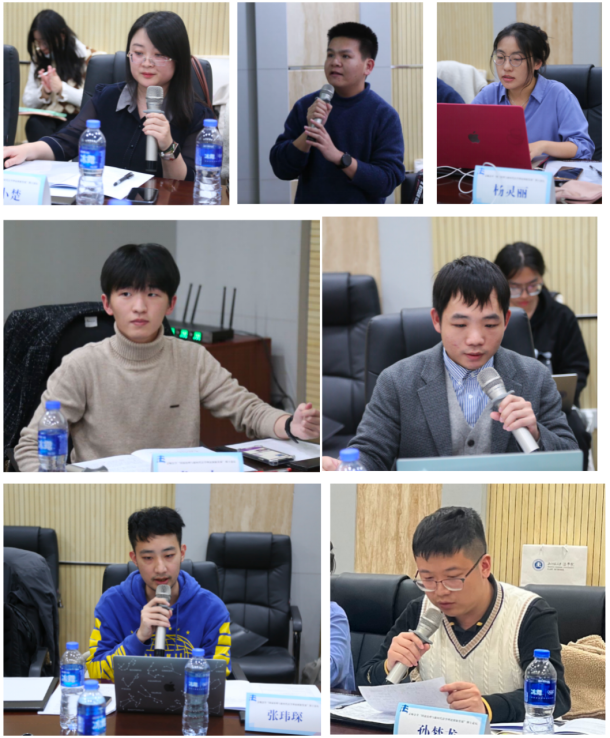
Yang Lingli analyzed the legislative situation related to data at both the national and local levels, and found that there are currently prohibitions and restrictions on data migration rights, vague user information rights, restricted exercise of data processing rights, challenges to data security, and legal risks of unfairness in cloud migration service agreements. In response, she proposed remedies through the establishment of data migration rights, policy tilt, and shared responsibility.
Qin Ruibiao believes that Lin Bin's article's discussion of liability and property rules is more aimed at promoting transactions and circulation, which is different from the copyright definition title of the article. For the writing structure, the article needs to delete the background introduction and enrich the parts that can prove the viewpoint. Suggest discussing together the development and challenges of deep synthesis technology, as well as the application and limitations of traditional copyright theory. For Yang Lingli's article, he believes that it has great practical significance. But the article did not organically combine legal issues for discussion. The legal risks of cloud computing user data migration proposed in the article blend legal and technical issues and need to be discussed in conjunction with existing laws. For Tian Xiaochu's article, he believes that starting from the introduction of the concept of the metaverse, the article reveals the possible problems of copyright law in the metaverse world. The article highlights the virtual world background of the metaverse in terms of problem awareness, but does not discuss in depth under what circumstances the law may not be applicable in the metaverse.
Zhang Weichen expressed his own opinions on the articles of three classmates. Regarding Tian Xiaochu's article, he believes that metaverse products cannot be completely equated with artificial intelligence products and further clarification is needed. He suggested that the examples given in the dispute over the recognition of the object of copyright standards need to be more macroscopic, while adding some practical cases for discussion. For Lin Bin's article, he believes that the article needs to consider whether deep synthesis products and AIGC are the same concept, increase the explanation of deep synthesis technology itself, and deeply analyze the two cases cited in the article and the ideas of the judge's judgment. For Yang Lingli's article, he believes that the topic selection is innovative, but the meaning of the word "cloud" in the article title needs to be considered. From a content perspective, it is necessary to separate policy and legislation, clarify the development of data migration rights, as well as the performance and risks of exercising data processing rights.
Sun Menglong believes that in Tian Xiaochu's article, it is necessary to consider whether the metaverse itself can generate objects and the differences between it and artificial intelligence generated objects. The analysis of the optimization of the intellectual property system in the article requires an analysis of the traditional industrial society and the intellectual property system, as well as their theoretical assumptions, and a comparison with metaverse technology to discuss its improvements in legal philosophy. For Lin Bin's article, he believes that the definition of copyright for deep synthesis should be based on data law, especially AIGC, to discuss the division of responsibilities between users and platforms. For Yang Lingli's article, he believes that we can draw on the data portability rights in the EU's GDP2 to discuss how to establish the data intermediary system as a trust mechanism between users and platforms in the Chinese market.
Teacher Yang Xu put forward his own suggestions on the articles of the three classmates. For Tian Xiaochu's article, he believes that attention should be paid to technical issues in paper writing. For Lin Bin's article, he believes that it needs to supplement the existing legal basis when raising questions. For Yang Lingli's article, he believes that it is necessary to extend the length of the article and conduct in-depth research on the system of personal information carrying rights in the Personal Information Protection Law and other departmental laws, in order to partially address the issues raised in the article. He also proposed that jurisprudence and legal economics are not necessarily in conflict, and researchers need to start from the perspective of jurisprudence and consider various values as much as possible within the entire evaluation framework. Subsequent research involves legal methodology, which involves interpreting legal norms and identifying loopholes in existing legal provisions. Based on this, further development and filling of loopholes are carried out to solve problems within the framework of interpretive theory. As we continue to explore cutting-edge technological issues, we also need to constantly return to traditional basic theories and legal methods. The norms in the field of new technology are still primarily provided by legislators. When legislators speak unclearly or the norms are incomplete, judges or other interpreters need to interpret or continue to create them.
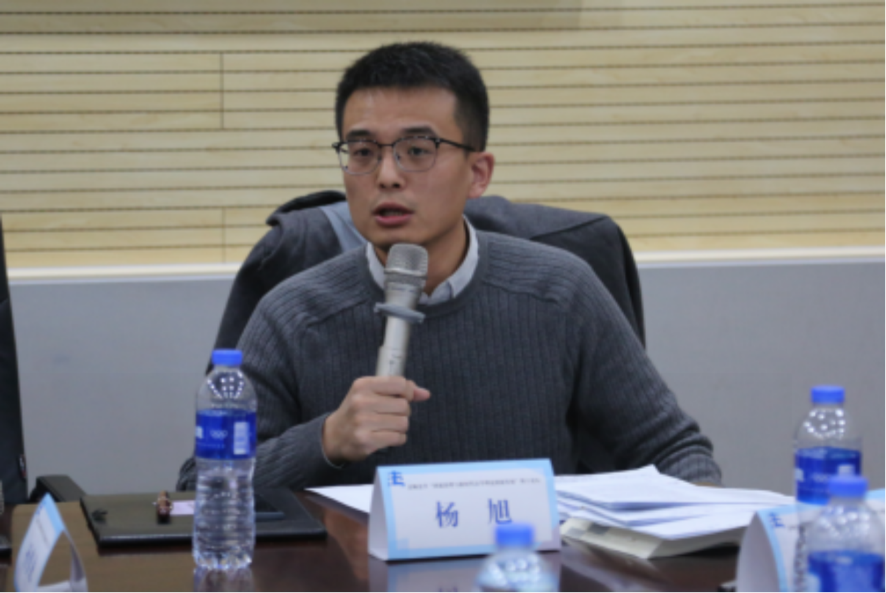
Award Ceremony and Closing Ceremony on November 18th afternoon
The conclusion of the forum was elegantly presided over by Li Dejia, a lecturer from the Law School of Beijing Normal University and the director of the LL.M. Affairs Office. In his closing address, Li Dejia reflected on his journey of chairing the BNU Science of Law Doctoral Forum, sharing profound insights and heartfelt sentiments. He extended his gratitude once more to all the doctoral candidates for their active engagement and valuable contributions.
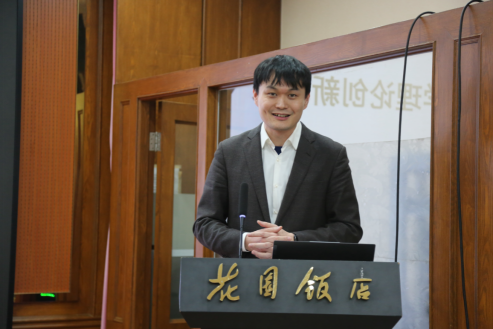
Subsequently, Professor Li Dejia announced the list of award winners for the 5th BNU Science of Law Doctoral Forum. There were a total of 12 award-winning papers in this forum. Among them, there were 2 first prizes, 4 second prizes, and 6 third prizes.
Finally, Professor Zhou Zhenjie, Vice Dean of the College for Criminal Law Science of Beijing Normal University, and Associate Professor He Dan, Vice Dean of the Law School of Beijing Normal University, delivered closing speeches respectively.
Vice Dean Zhou Zhenjie began by extending a warm welcome to all the doctoral students who participated in the forum, expressing congratulations on its successful conclusion and sharing genuine delight for the students who received awards. He emphasized that the forum serves as a remarkable platform for doctoral students to engage in intellectual exchange and that it has yielded rich outcomes. Dean Zhou encapsulated the event's essence by highlighting its blend of tradition and modernity, the synergy of domestic and international perspectives, the fusion of theory and practice, the interdisciplinary mingling of professions, and the bridging of generations. He expressed his sincere hope that the BNU Science of Law Doctoral Forum will continue to be organized in the future and urged all participating doctoral students to persist in their support for the Law School of Beijing Normal University's activities and endeavors.
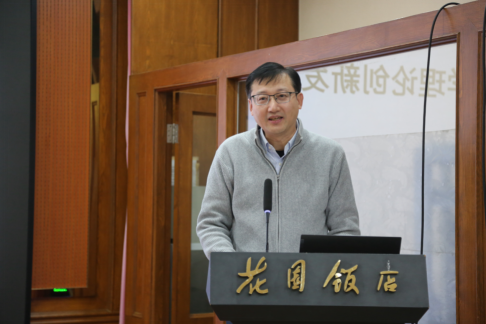
Vice Dean He Dan's address was centered on conveying three expressions of gratitude and one aspiration. She extended her heartfelt thanks to the panel of experts for their diligent efforts both in preparation for and during the conference, to all the students for their participation, and to the conference team for their dedicated work under the leadership of Li Dejia and Yan Houfu. Vice Dean He Dan harbors a hopeful expectation that the master's and doctoral students at the Beijing Normal University Law School will diligently pursue their studies, continue to advance, and make remarkable contributions to the future progress of Chinese jurisprudence.

The Beijing Normal University Science of Law Doctoral Forum has not only served as a premier academic exchange platform for law doctoral students from diverse universities nationwide but has also offered young scholars a venue to showcase their talents and foster collective growth, garnering an enthusiastic response from participating doctoral students and distinguished experts. Moreover, this forum has eloquently captured the passion and youthful spirit of the new generation of scholars and doctoral students, who are committed to contributing their research to the soil of their homeland. With that, the 5th BNU Science of Law Doctoral Forum has drawn to a successful close, and we eagerly anticipate our reunion in the early winter of the coming year!

